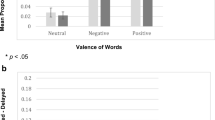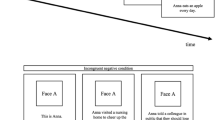Abstract
Recent research in depression has raised questions concerning the accuracy with which environmental information is processed. The present study was designed to address this issue by examining the perception and recall of evaluative feedback in clinically depressed psychiatric patients in an interpersonal situation. Depressed and nondepressed psychiatric inpatients and nondepressed hospital employees participated in dyadic interactions with age-matched opposite-sex strangers, discussing their responses to a variety of hypothetical situations. Following the interaction, each subject was given a sheet of paper containing ratings on 13 bipolar adjectives, ostensibly an evaluation of the subject completed by an assistant behind a one-way mirror. In fact, all subjects received identical rating sheets. Subjects were asked to indicate their reactions to this evaluation and were subsequently required to reproduce the evaluation from memory on a blank rating sheet. Although no group differences were obtained with respect to the perceived accuracy of the evaluation, the depressed patients considered the assessment to be less favorable overall than did subjects in either of the nondepressed groups. Furthermore, the depressed subjects, to a significantly greater extent than the nondepressed subjects, recalled the evaluation to be more negative than was actually the case. These results are discussed in terms of both cognitive and interpersonal models of depression, and directions for future research are advanced.
Similar content being viewed by others
References
Abramson, L. Y., Garber, J., Edwards, N. B., & Seligman, M. E. P. Expectancy changes in depression and schizophrenia.Journal of Abnormal Psychology 1978,87 102–109.
Alloy, L. B., & Abramson, L. Y. Judgment of contingency in depressed and nondepressed students: Sadder but wiser?Journal of Experimental Psychology: General 1979,108 441–485.
Beck, A. T.Depression: Causes and treatments. Philadelphia: University of Pennsylvania Press, 1967.
Beck, A. T.Cognitive therapy and the emotional disorders. New York: International Universities Press, 1976.
Beck, A. T., Rush, A. J., Shaw, B. F., & Emery, G.Cognitive therapy of depression. New York: Guilford Press, 1979.
Beck, A. T., Ward, C. H., Mendelson, M., Mock, J., & Erbaugh, J. An inventory for measuring depression.Archives of General Psychiatry 1961,4 561–571.
Buchwald, A. M. Depressive mood and estimates of reinforcement frequency.Journal of Abnormal Psychology 1977,86 443–446.
Buchwald, A. M., Coyne, J. C., & Cole, C. S. Critical evaluation of the learned helplessness model of depression.Journal of Abnormal Psychology 1978,87 180–193.
Costello, C. G. Depression: Loss of reinforcers or loss of reinforcer effectiveness?Behavior Therapy 1972,3 240–247.
Coyne, J. C. Toward an interactional description of depression.Psychiatry 1976,39 28–40.
Craighead, W. E., Hickey, K. S., & DeMonbreun, B. G. Distortion of perception and recall of neutral feedback in depression.Cognitive Therapy and Research 1979,3 291–298.
DeMonbreun, B. G., & Craighead, W. E. Distortion of perception and recall of positive and neutral feedback in depression.Cognitive Therapy and Research 1977,1 311–329.
Depue, R. A., & Monroe, S. M. Learned helplessness in the perspective of the depressive disorders: Conceptual and definitional issues.Journal of Abnormal Psychology 1978,87 3–20.
Feighner, J. P., Robins, E., Guze, S. B., Woodruff, R. A., Winokur, G., & Munoz, R. Diagnostic criteria for use in psychiatric research.Archives of General Psychiatry 1972,26 57–63.
Ferster, C. B. Behavioral approaches to depression. In R. J. Friedman & M. M. Katz (Eds.),The psychology of depression: Contemporary theory and research. Washington: Winston, 1974.
Golin, S., Terrell, F., & Johnson, B. Depression and the illusion of control.Journal of Abnormal Psychology 1977,86 440–442.
Golin, S., Terrell, F., Weitz, J., & Drost, P. L. The illusion of control among depressed patients.Journal of Abnormal Psychology 1979,88 440–442.
Gotlib, I. H. Self-reinforcement and depression in interpersonal interaction. The role of performance level.Journal of Abnormal Psychology 1982,91 3–13.
Gotlib, I. H., & Asarnow, R. F. Interpersonal and impersonal problem-solving skills in mildly and clinically depressed university students.Journal of Consulting and Clinical Psychology 1979,47 86–95.
Gotlib, I. H., & Asarnow, R. F. Independence of interpersonal and impersonal problemsolving skills: Reply to Rohsenow.Journal of Consulting and Clinical Psychology 1980,48 286–288.
Hamilton, M. A rating scale for depression.Journal of Neurology, Neurosurgery, and Psychiatry 1960,23 56–62.
Higgins, E. T., Kuiper, N. A., & Olson, J. M. Social cognition. A need to get personal. In E. T. Higgins, C. P. Herman, & M. P. Zanna (Eds.),Social cognition: The Ontario symposium. Hillsdale, New Jersey: Erlbaum, 1981.
Lazarus, A. A. Learning theory and the treatment of depression.Behaviour Research and Therapy 1968,6 83–89.
Lewinsohn, P. M. A behavioral approach to depression. In R. J. Friedman & M. M. Katz (Eds.),The psychology of depression: Contemporary theory and research. Washington: Winston, 1974.
Lewinsohn, P. M., Mischel, W., Chaplin, W., & Barton, R. Social competence and depression: The role of illusory self-perceptions?Journal of Abnormal Psychology 1980,89 236–246.
Miller, D. T., & Ross, M. Self-serving biases in the attribution of causality: Fact of fiction?Psychological Bulletin 1975,82 213–225.
Nelson, R. E., & Craighead, W. E. Selective recall of positive and negative feedback, self-control behaviors, and depression.Journal of Abnormal Psychology 1977,86 379–388.
O'Banion, K., & Arkowitz, H. Social anxiety and selective memory for affective information about the self.Social Behavior and Personality 1977,5 321–328.
Rizley, R. Depression and distortion in the attribution of causality.Journal of Abnormal Psychology 1978,87 32–48.
Strodtbeck, F. L. Husband-wife interaction over revealed differences.American Sociological Review 1951,16 468–473.
Wener, A. E., & Rehm, L. P. Depressive affect: A test of behavioral hypotheses.Journal of Abnormal Psychology 1975,84 221–227.
Author information
Authors and Affiliations
Rights and permissions
About this article
Cite this article
Gotlib, I.H. Perception and recall of interpersonal feedback: Negative bias in depression. Cogn Ther Res 7, 399–412 (1983). https://doi.org/10.1007/BF01187168
Issue Date:
DOI: https://doi.org/10.1007/BF01187168




